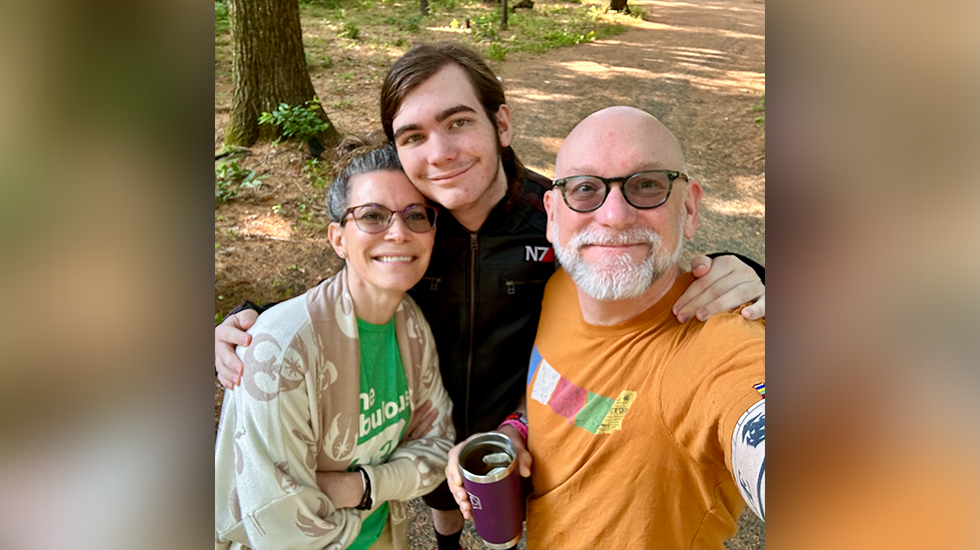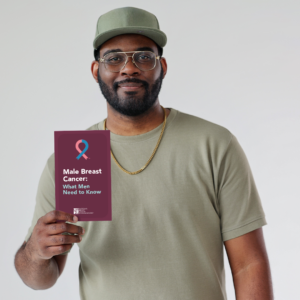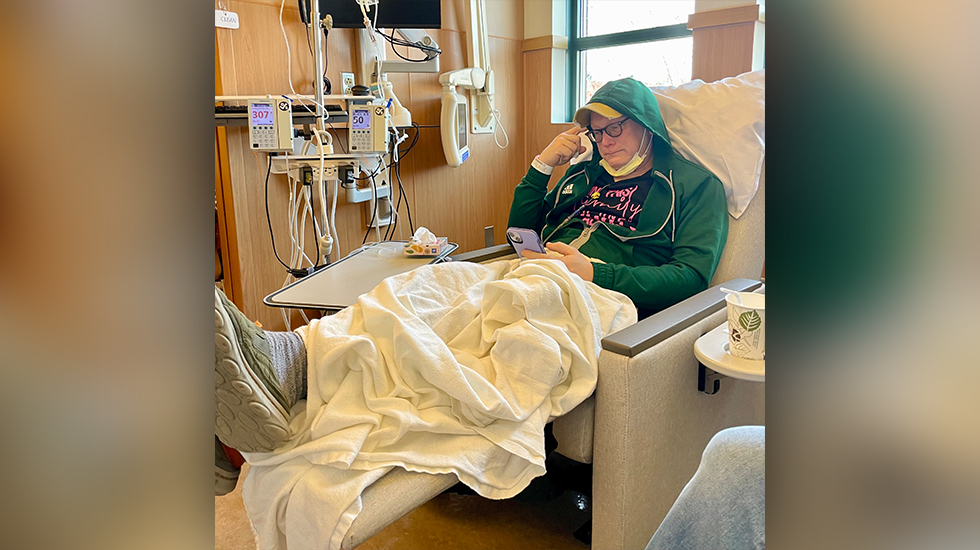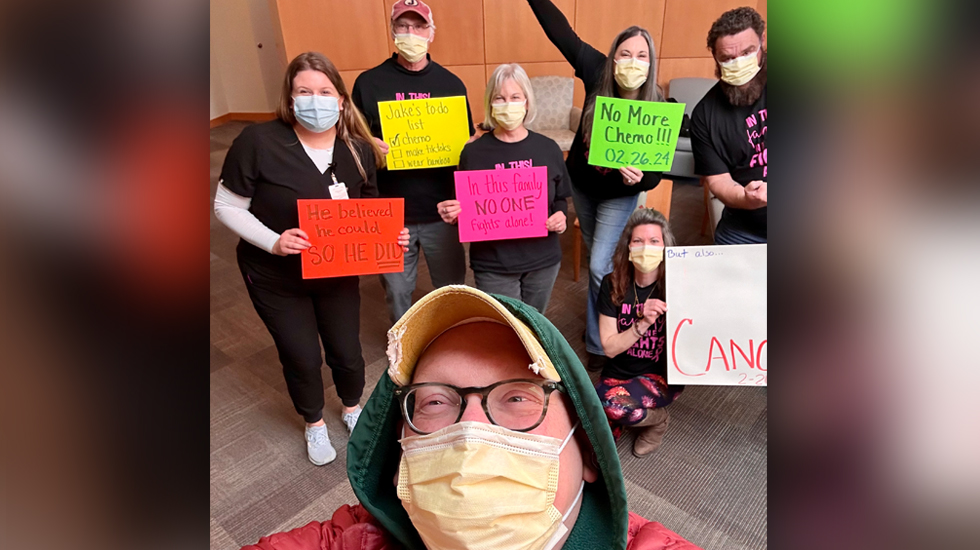


When many people think of breast cancer, they often picture it as a woman’s disease. Yet breast cancer doesn’t discriminate and can impact anyone, regardless of gender. In 2025, it is estimated that 2,800 men in the U.S. will be diagnosed with breast cancer, and that 510 U.S. men will die from the disease.
We recently spoke with Jake, a husband, father, and grandfather, who knows this truth all too well after he was diagnosed with Stage 4 estrogen receptor-positive (ER+) invasive ductal carcinoma (IDC).
Jake shares that his journey began with a lump in his armpit—a symptom he brushed off for months, believing the common misconception that men don’t get breast cancer. That delay, as he now shares, allowed the disease time to spread from his breast tissue to his hip before it was finally diagnosed, resulting in an advanced breast cancer diagnosis.
“Getting to that diagnosis was a bit of a journey, partly because male breast cancer tends to get caught later than in women, which often means it’s more advanced when we finally find it,” he recalls.
Jake says the early days of his diagnosis were emotionally overwhelming: “When the diagnosis finally came, it hit me with a whole mix of emotions: pure shock, total disbelief, and honestly, a real feeling of emasculation.”
On top of this shock and emotional turmoil, Jake says that nearly every resource he encountered left him feeling even more isolated at a time when he needed support most: “It was tough, especially because almost all the information and support out there seemed to be made for women. Every brochure, every website, it all said ‘she.’ That just made the whole experience feel really isolating and pretty awkward.”
But rather than staying silent, Jake chose to speak out. He began sharing his story on social media, transforming his isolating experience into a platform for raising awareness and fostering community. Through his social media platforms, Jake now works to educate men about their risk for breast cancer and challenges the misconception that only women can develop the disease.
“We’ve got to normalize it, push for early detection, and keep the conversation going about treatment,” Jake shares. “It’s tough, emotionally and physically, but sharing my story has become this incredibly powerful way to raise awareness.”

Learn more about male breast cancer, including signs and symptoms, risk factors, and how men can practice early detection for breast cancer in this free eBook.
Like many with advanced breast cancer, Jake’s treatment path has not been straightforward. Initially misdiagnosed with Stage 2 breast cancer, he was told he would complete treatment—chemotherapy, surgery, and radiation—in under a year. But cancer often has other plans, and Jake’s diagnosis was changed to Stage 4 metastatic breast cancer when cancer was found in his hip bone.
Metastatic breast cancer (MBC) is advanced breast cancer that has spread from the breast tissue to other areas of the body, such as the bones, liver, lungs, or brain. For those living with MBC, like Jake, breast cancer will be a part of their life for the rest of their life.
Now two years later, Jake is still undergoing regular scans and adjusting his treatment approach as needed. “Living with breast cancer means I’m constantly on my toes, and thankfully, I’ve got an incredible team by my side. For my wife and family, the news sparked an incredible wave of support. What could have been a really tough moment actually turned into this collective surge of determination, with everyone rallying around me. It hammered home this powerful message: Putting your health first is always the right move.”

Jake’s advice for other men is clear: don’t ignore symptoms, no matter how small. A lump, swelling, or change in the chest area should never be dismissed. “Don’t brush off a lump or any weird changes because you think, ‘Oh, that’s a woman’s disease,’” he emphasizes. “It’s not. It’s everyone’s disease, and ignoring it could cost you a lot.”
To all patients—men and women alike—Jake offers this advice: Become your own champion. He encourages patients to ask questions, pursue second opinions when necessary, and not be afraid to speak up when something doesn’t feel right. Beyond the physical, Jake also emphasizes the importance of emotional health. “This fight is draining,” he says. “Allow yourself to rest, to grieve, to connect with people who lift you up. Taking care of your mental and emotional health is just as critical as the physical treatments.”

Jake’s journey is not just one of survival; it’s one of purpose. By speaking out, he is helping to shift the conversation and stigma around male breast cancer by encouraging others to pay attention to their health, advocate for themselves, and support one another.
For Jake, the mission is clear: “It’s about breaking down the stigma, challenging outdated narratives, and ensuring that breast cancer awareness and care truly reflect the diverse world we live in. My goal is to help build something bigger than my own story—a movement where every single person affected by breast cancer feels seen, supported, and gets the care they deserve.”
To follow Jake’s journey with male breast cancer, you can find him on Instagram or TikTok at @theguywithstage4breastcancer.
National Breast Cancer Foundation is here for you as you navigate a breast cancer diagnosis. Visit our website to learn about NBCF breast cancer support groups, obtain free educational resources, or find a patient navigator in your area.
Donations are always appreciated, but there are lots of great ways to get involved.


My husband became one of the statistics from 2025, He died November 6, 2025 from metastatic HR+HER2- breast cancer. He initially had bilateral mastectomy August 2022 and September 2022. No further imaging was ever done. Only bloodwork and palpation exam. He weighed 485lbs. Had imaging been done I don’t think he would have went from stage 1A to stage 4 in 3 years without it being caught sooner and treated! This NEEDS TO BE A NEW STANDARD OF CARE!!